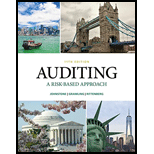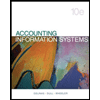
Auditing: A Risk Based-Approach (MindTap Course List)
11th Edition
ISBN: 9781337619455
Author: Karla M Johnstone, Audrey A. Gramling, Larry E. Rittenberg
Publisher: Cengage Learning
expand_more
expand_more
format_list_bulleted
Question
Chapter 9, Problem 24RQSC
To determine
Introduction:The risk of material misstatement is the risk in which the financial statements of an organization have been misstated. Such risks are assessed by auditors at assertion level and at financial statement level.
To ascertain: the type of financial statement misstatement result for the transaction processing deficiencies as the cause to increase control risk
Expert Solution & Answer
Want to see the full answer?
Check out a sample textbook solution
Students have asked these similar questions
Please explain the correct approach for solving this financial accounting question.
Compute the gross profit? Financial accounting
Financial accounting
Chapter 9 Solutions
Auditing: A Risk Based-Approach (MindTap Course List)
Ch. 9 - In the revenue cycle, the most significant...Ch. 9 - Which of the following statements is true...Ch. 9 - Prob. 4CYBKCh. 9 - Prob. 7CYBKCh. 9 - Prob. 8CYBKCh. 9 - Prob. 9CYBKCh. 9 - Prob. 10CYBKCh. 9 - Prob. 11CYBKCh. 9 - Prob. 12CYBKCh. 9 - Prob. 13CYBK
Ch. 9 - Prob. 14CYBKCh. 9 - Prob. 15CYBKCh. 9 - Prob. 16CYBKCh. 9 - Prob. 17CYBKCh. 9 - Prob. 18CYBKCh. 9 - Which of the following statements is false...Ch. 9 - Prob. 20CYBKCh. 9 - Prob. 22CYBKCh. 9 - Prob. 23CYBKCh. 9 - Prob. 24CYBKCh. 9 - Prob. 25CYBKCh. 9 - Prob. 26CYBKCh. 9 - Prob. 27CYBKCh. 9 - Prob. 28CYBKCh. 9 - Prob. 29CYBKCh. 9 - Prob. 30CYBKCh. 9 - Prob. 31CYBKCh. 9 - Prob. 32CYBKCh. 9 - Refer to Exhibit 9.1. Which accounts are relevant...Ch. 9 - Prob. 2RQSCCh. 9 - Prob. 3RQSCCh. 9 - An important task ¡n the audit of the revenue...Ch. 9 - Prob. 5RQSCCh. 9 - Prob. 6RQSCCh. 9 - Prob. 7RQSCCh. 9 - Prob. 8RQSCCh. 9 - Prob. 9RQSCCh. 9 - Prob. 10RQSCCh. 9 - Prob. 11RQSCCh. 9 - Prob. 12RQSCCh. 9 - Prob. 13RQSCCh. 9 - Prob. 14RQSCCh. 9 - Prob. 15RQSCCh. 9 - Stainless Steel Specialties (SSS) is a...Ch. 9 - Prob. 17RQSCCh. 9 - Prob. 18RQSCCh. 9 - Prob. 19RQSCCh. 9 - Prob. 20RQSCCh. 9 - Prob. 21RQSCCh. 9 - Prob. 22RQSCCh. 9 - Prob. 23RQSCCh. 9 - Prob. 24RQSCCh. 9 - Prob. 25RQSCCh. 9 - Prob. 26RQSCCh. 9 - Prob. 27RQSCCh. 9 - Prob. 28RQSCCh. 9 - Prob. 29RQSCCh. 9 - Prob. 30RQSCCh. 9 - Prob. 31RQSCCh. 9 - Prob. 32RQSCCh. 9 - Prob. 33RQSCCh. 9 - Prob. 34RQSCCh. 9 - Prob. 35RQSCCh. 9 - Prob. 36RQSCCh. 9 - Prob. 37RQSCCh. 9 - Prob. 38RQSCCh. 9 - Prob. 39RQSCCh. 9 - Read the following scenario about Strang...Ch. 9 - Prob. 41RQSCCh. 9 - Prob. 42RQSCCh. 9 - ZYNGA (LO Z 3, 4, 5, 6, 8) Refer to the Why It...Ch. 9 - UTSTARCOM, INC. (LO 2, 3, 4, 5, 6, 8) UTStarcom is...Ch. 9 - Prob. 47FFCh. 9 - Prob. 48FFCh. 9 - Prob. 55DAUA
Knowledge Booster
Similar questions
arrow_back_ios
SEE MORE QUESTIONS
arrow_forward_ios
Recommended textbooks for you
 Auditing: A Risk Based-Approach (MindTap Course L...AccountingISBN:9781337619455Author:Karla M Johnstone, Audrey A. Gramling, Larry E. RittenbergPublisher:Cengage Learning
Auditing: A Risk Based-Approach (MindTap Course L...AccountingISBN:9781337619455Author:Karla M Johnstone, Audrey A. Gramling, Larry E. RittenbergPublisher:Cengage Learning Auditing: A Risk Based-Approach to Conducting a Q...AccountingISBN:9781305080577Author:Karla M Johnstone, Audrey A. Gramling, Larry E. RittenbergPublisher:South-Western College Pub
Auditing: A Risk Based-Approach to Conducting a Q...AccountingISBN:9781305080577Author:Karla M Johnstone, Audrey A. Gramling, Larry E. RittenbergPublisher:South-Western College Pub Pkg Acc Infor Systems MS VISIO CDFinanceISBN:9781133935940Author:Ulric J. GelinasPublisher:CENGAGE L
Pkg Acc Infor Systems MS VISIO CDFinanceISBN:9781133935940Author:Ulric J. GelinasPublisher:CENGAGE L

Auditing: A Risk Based-Approach (MindTap Course L...
Accounting
ISBN:9781337619455
Author:Karla M Johnstone, Audrey A. Gramling, Larry E. Rittenberg
Publisher:Cengage Learning

Auditing: A Risk Based-Approach to Conducting a Q...
Accounting
ISBN:9781305080577
Author:Karla M Johnstone, Audrey A. Gramling, Larry E. Rittenberg
Publisher:South-Western College Pub

Pkg Acc Infor Systems MS VISIO CD
Finance
ISBN:9781133935940
Author:Ulric J. Gelinas
Publisher:CENGAGE L